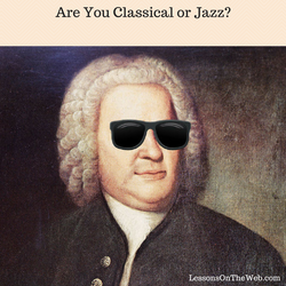|
If someone were to ask you, “what type of pianist are you, classical or Jazz”…how would you answer that?
For purposes of this post, ‘Jazz” also includes pop music, rock n roll, and any other kind of music other than classical. Have you ever even put a “label” on what kind of pianist you are? Do you play mostly popular tunes that you’ve heard on the radio and pick out by ear on your piano? Or…do you seek out famous composers from all time periods who have written treasured concertos and other piano works that require you to read notes and master some difficult keyboard techniques? Is one better than the other? Classical Pianists essentially partner with the composer of the piece they are learning. They are taking the written thoughts and ideas created by usually one person and making those thoughts through notes come to life, by performing it. Have you ever thought about the fact that we’re still playing Bach’s music today…even though it was written/composed in the 1700’s? It’s the same with hundreds of other composers: Brahms, Beethoven, Mozart, Schubert, Haydn, Handel, Chopin, Mahler, Bartok, Grieg…just to name a few. In order to learn and play classical music, one must learn note reading, rhythm, and all of the other aspects to playing the piano. The more skills you have mastered, the harder the pieces become that you can learn and perform. For many, this is the only way they want to play their piano. There is a sort of reverence for each composer and the uniqueness of each piece; with the specific technical challenges that a concerto may offer for a pianist to accomplish. The goal in this case, is to “master” technique, in order to play the “master” pieces…so to say. Jazz or Pop Pianists essentially partner with other musicians in order to create and produce live music. Note…that classical musicians partner with the composer, and in this style, usually…musicians are playing and improvising with each other in a live setting. Seldom if ever, will you see musicians that play jazz and or pop/rock n roll music together reading from music on stage while they are playing. Instead, they know how to play by picking out the music by ear…and create music by going back and forth between the different players in the group. The focus is on spontaneous music created between the musicians, rather than mastering technical skills to perform very difficult already-composed music. Many musicians that play this way did in fact begin by learning their notes, music theory, rhythm, and especially chords and how chords can be changed around to make different sounds. However, they moved away from playing just by reading notes and music on paper, in order to express their own music, instead of music written by someone else. As far as whether one style of playing is “better than” the other, that really depends on each individual player, and what their personal goals are in playing the piano. Maybe instead of figuring out which one is better, it might be better to try both! It makes sense, that the more you know how to do on the piano technically, the more you’ll be able to do in improvisational settings. Learning the basics of note reading and especially scales and chords will only improve your ability to play with others in a live setting, without having to rely on written music. One of the most exciting things for many musicians is transitioning from playing by written notes only, to creating their own music. So when the next time someone asks you what kind of a pianist are you, you might be able say, “I’m both!” Stay tuned to LessonsOnTheWeb to learn much more! Leave a Reply. |
AuthorMost blogs written by Archives
June 2020
Categories
All
|


 RSS Feed
RSS Feed